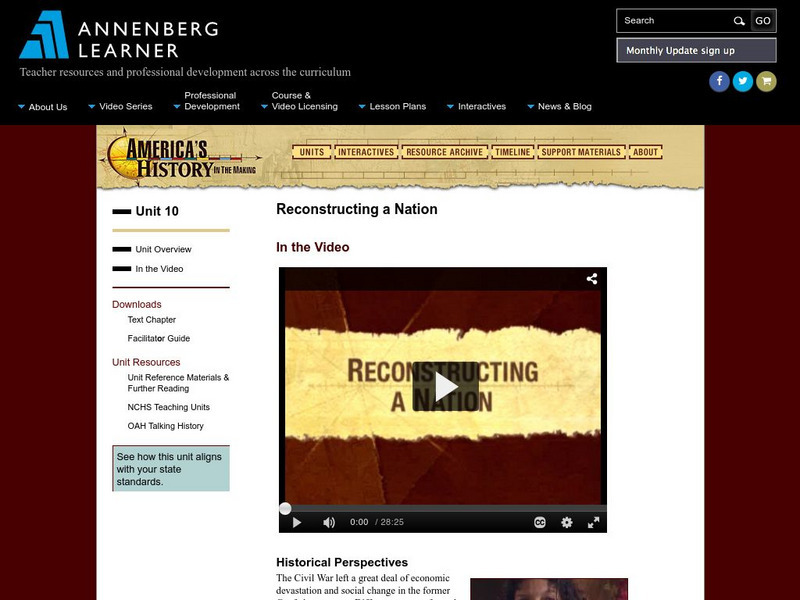Makematic
Plessy v. Ferguson
In 1892, Homer Plessy's arrest for sitting in a train car reserved for White passengers led to a Supreme Court decision that endorsed racial segregation under the "separate but equal" doctrine.
Makematic
The 14th Amendment
The 14th Amendment, ratified in 1868, redefined American liberty by ensuring citizenship rights, due process, and equal protection under the law, marking a pivotal shift during Reconstruction.
Makematic
The Chinese Exclusion Act
The Chinese Exclusion Act of 1882 barred Chinese immigration into the United States, the first time the U.S. government had barred an ethnic group, leading to decades of injustice.
Makematic
13th Amendment
The Thirteenth Amendment abolished slavery in the United States in 1865. But it was just the beginning of a long fight for equality and civil rights.
Makematic
The Impact of the Civil War
On April 12, 1861, Confederate forces attacked Fort Sumter, South Carolina, marking the explosive start of the Civil War. The conflict led to short-lived progress and long-term struggles for true racial equality.
Curated Video
In re Gault: Juvenile Rights
In re Gault was a landmark U.S. Supreme Court decision that ensured juveniles accused of a crime would receive the same Fourteenth Amendment rights as adults. It all stemmed from a teenager making a prank call.
Mr. Beat
How Animal Guts Gutted the 14th Amendment | The Slaughterhouse Cases
In episode 51 of Supreme Court Briefs, animal guts in the drinking water of New Orleans leads to the first major interpretation of the 14th Amendment by the Supreme Court.
Curated Video
Plessy v. Ferguson: Separate but Equal
Plessy v. Ferguson was a landmark U.S. Supreme Court decision that established the legal doctrine of “separate but equal”. It was a ruling that enabled many states to enact racial segregation laws for decades to come.
Curated Video
In re Gault: Juvenile Rights
In re Gault was a landmark U.S. Supreme Court decision that ensured juveniles accused of a crime would receive the same Fourteenth Amendment rights as adults. It all stemmed from a teenager making a prank call.
Mazz Media
Incorporation Doctrine
The program explains that the Bill of Rights only applied to actions by the federal government and that state governments were not obligated to uphold those rights. Students will learn how the Supreme Court, interpreted the Fourteenth...
Wonderscape
History Kids: Constitutional Amendments 11 - 15
The video discusses the 11th, 12th, 13th, 14th, and 15th Amendments to the United States Constitution. It explores how these amendments have shaped our country and affected the lives of citizens, particularly focusing on issues such as...
PBS
Pbs Learning Media: Simple Justice 4: Arguing the Fourteenth Amendment
This segment from American Experience: "Simple Justice" explores the issue at the heart of Brown v. Board of Education: whether the Fourteenth Amendment applied to segregated schools. [5:50]
Gilder Lehrman Institute of American History
Gilder Lehrman Institute: History Now: The Legal Battle for Racial Equality, 1787 1954
[Free Registration/Login Required] Larry Kramer, Stanford Law School, offers thorough insight into the advancement of Civil Rights. The pursuit of racial equality surfaces during the Civil War and builds through the Civil Rights Movement...
PBS
Pbs Learning Media: Crash Course Government and Politics: Equal Protection
In this episode, we discuss the most important part of the Constitution-the Fourteenth Amendment. In particular, we discuss the "equal protection" clause and how it relates to our civil rights. We've discussed in previous episodes civil...
Annenberg Foundation
Annenberg Learner: America's History in the Making: Reconstructing a Nation
This video delves into the challenges and opportunities that arose during the Reconstruction period following the Civil War and, in particular, re-unifying the states. [28:25]
Center For Civic Education
60 Second Civics: Rights of African Americans Pt. 12: Passage of 14th Amendment
It wasn't easy to pass the Fourteenth Amendment. Even the President was against it.
Center For Civic Education
60 Second Civics: Equal Protection: Introduction
An introduction to the equal protection clause in the Fourteenth Amendment and what it covers.
Center For Civic Education
60 Second Civics: Equal Protection Clause
The Supreme Court decision in the case of Yick Wo v. Hopkins (1886) held that a San Francisco ordinance against Chinese laundries violated the equal protection clause.
Center For Civic Education
60 Second Civics: Creating Bill of Rights Pt. 7: The Bill of Rights Is Adopted
On December 15, 1791, the Bill of Rights was finally ratified by the states. It wasn't until the Fourteenth Amendment that citizens would be protected by the Constitution against violation of their rights by state governments.
Center For Civic Education
60 Second Civics: Rights of African Americans Pt. 11: Due Process
The due process and equal protection clauses are considered by many scholars to be the most important clauses in the Constitution. Find out why on today's podcast.
Center For Civic Education
60 Second Civics: Rights of African Americans Pt.15: Federal Bill of Rights
The Supreme Court had an opportunity in 1873 to extend the protections of the federal Bill of Rights to the states. It decided not to.
Center For Civic Education
60 Second Civics: Civil Rights Part 1: Introduction
In this episode, we introduce our series on civil rights in the United States.
Center For Civic Education
60 Second Civics: The Thirteenth and Fourteenth Amendments
The Thirteenth and Fourteenth Amendments made critical changes to the Constitution, such as the abolition of slavery, that addressed issues not settled at the Constitutional Convention or by the Civil War.
Center For Civic Education
60 Second Civics: Incorporation Part 1
The Supreme Court was at first hesitant to apply the Fourteenth Amendment to protect individual rights and left this up to the states, as many had their own bill of rights.


